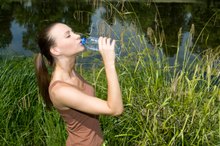Proper Percentage of Water in the Body
Your total body weight is comprised of anywhere from 45 to 70 percent water according to the National Strength and Conditioning Association. The more you exercise and the more muscle tissue you have the more water you have in your body because muscle is 70 percent water and 20 percent body fat. Water is the largest component of your body so proper hydration is vital to your health and performance.
Estimating Daily Fluid Needs
Most doctors recommend drinking 8 to 9 cups of water per day to maintain proper hydration. It is easy for people to remember though this may not be enough fluids for many people. The Institute of Medicine recommends that men drink 13 cups or 3 liters of fluids per day and suggests women drink 9 cups or 2.2 liters per day. The most important thing is that you do not get thirsty as this is a sign that you are already dehydrated.
How Water is Lost
How to Calculate How Much Water To Drink Daily
Learn More
Water is lost from your body in four major ways. Through breathing, urine, bowel movements and perspiration. Perspiration is the one cause that can fluctuate the most on a day to day basis due to the activities that you perform and the intensity at which you perform them. On a warm day you may sweat a little while gardening and should increase your fluids. But running outside on a warm day for an extended period of time may produce a lot of fluid loss that needs to be replaced.
Exercise and Fluid Replacement
Nancy Clark, MS, RD recommends pre-hydrating your body before activity so that you begin in water balance. She advises drinking 2 to 3 milliliters per pound of body weight 4 hours before activity. For fluid replacement after a strenuous exercise session or competition, you need to weigh yourself before and after the activity. The National Strength and Conditioning Association recommends drinking 1 pint of fluid for every pound lost to ensure adequate hydration. Drinking plain water and a sports drink that has electrolytes will enhance hydration.
Dangers of Dehydration
Weight Loss and Feeling Thirsty
Learn More
Water is important for every process in your body. Thirst is a sign that you are already dehydrated and this can lead to more serious problems. When you become dehydrated, your body cannot control its temperature. This can lead to heatstroke, heat exhaustion or in extreme cases death. Fluid losses of 1 percent can lead to an elevation of your core body temperature. Lose 3 to 5 percent of your body weight and it puts a strain on your cardiovascular system. A 7 percent loss collapse is very likely.
Considerations
Exercise and perspiration are not the only factors to consider when keeping your body hydrated. If you live in a warm or dry climate you may need to increase your fluids. Certain health conditions or illnesses can also affect your hydration levels. Women that are pregnant or breast-feeding should also increase their fluids. Speak to your doctor about your health and activity level to determine your hydration needs and what the best options are for you.
Related Articles
References
Writer Bio
Bethany Kochan began writing professionally in 2010. She has worked in fitness as a group instructor, personal trainer and fitness specialist since 1998. Kochan graduated in 2000 from Southern Illinois University with a Bachelor of Science in exercise science. She is a Certified Strength and Conditioning Specialist, Certified Personal Trainer, Medical Exercise Specialist and certified YogaFit instructor.









